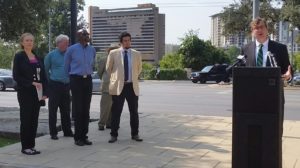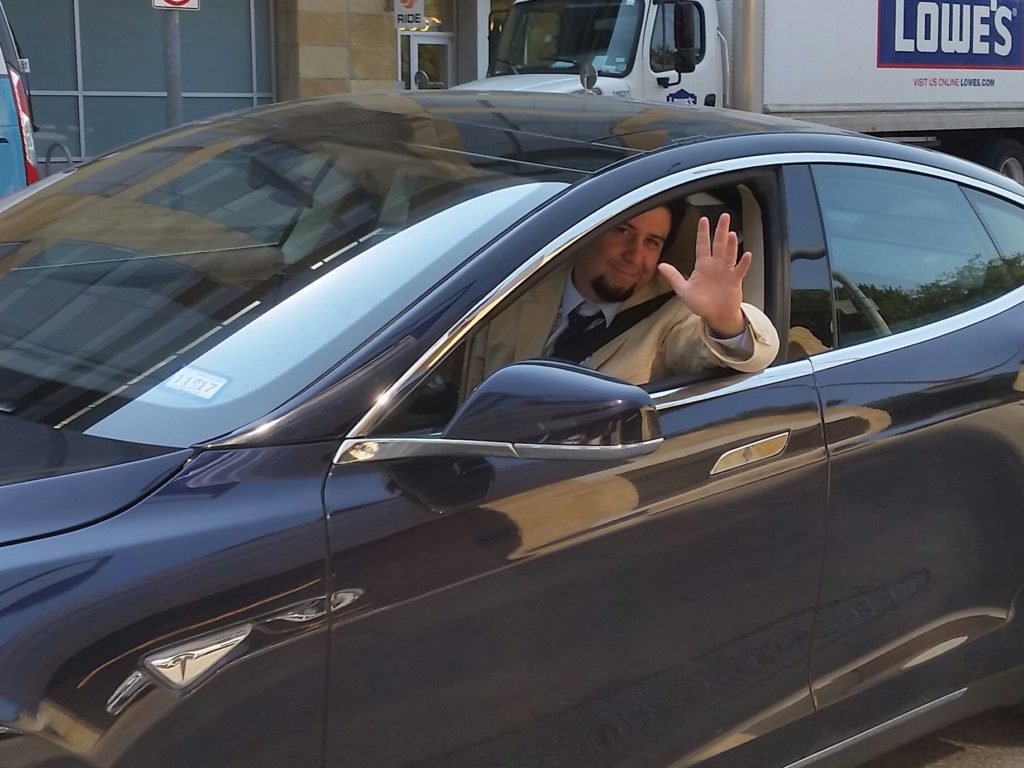Texas Climate Tour: Remarks by Adrian

This speech was delivered by our Texas Office director Adrian Shelley at the kickoff event for our Texas Climate Tour.
Dear Friends and Allies,
Thank you for coming today. I would especially like to thank Mayor Steve Adler and the City of Austin for hosting us this morning. I would also like to thank our speakers, including Mayor Adler, Jim Marston with the Environmental Defense Fund, Reggie James with the Sierra Club, Professor Kerry Cook with the University of Texas, and of course, our press officer Luis Castilla.
Climate change is one of the defining issues of our time. How we act now to prevent the worst impacts of climate change will define us for generations to come. Our leaders in Washington D.C., and even here in Austin, are not willing to face the threat of climate change. This means that we must act now to do everything that we can.
Luis began planning this trip well before any of us knew what was in store for Texas. Now Hurricane Harvey has ravaged our coast, claimed dozens of lives, and displaced tens of thousands of people. My hometown of Houston was devastated by Hurricane Harvey, and though the recovery effort will last many years and cost many hundreds of billions of dollars, the city will never fully recover. Harvey has left a deep scar on the Gulf Coast that will not soon heal. Our leaders in Texas have said the cost of reducing CO2 is too great, but now we see that the cost of inaction is far greater.
The tragedy of Hurricane Harvey unfolded over several days in full view of the entire nation. But there is another tragedy occurring on the Texas Gulf Coast. Every day lives are shortened by the impact of the fossil fuel industry. Each day in Houston, in Corpus Christi, in Port Arthur, and in other towns along the coast we see the impacts of this tragedy. Asthma attacks, cancer, and shortened lives are the daily result of a nationwide disaster caused by our reliance on fossil fuels. Climate change is only the biggest of these impacts, but we must be mindful of their daily cost on our most vulnerable brothers and sisters across the state.
Houstonians will recover from the unprecedented disaster that was Hurricane Harvey. They have done so before. But what will happen after the memory of this storm fades? Will we prepare for the next one?
As a nation, we need to rise to this challenge. If our lawmakers in Washington D.C. won’t act, then we need to act for them. As Luis travels across Texas, he will spread the message about what is possible today. Cities occupy only two percent of the world’s landmass, but they consume 2/3 of the world’s energy and account for more than 70% of global carbon emissions. And with 90 percent of the world’s urban areas situated on coastlines, cities are vulnerable to climate change impacts, such as rising sea levels and powerful coastal storms.
So what can cities do? They can start by counting their carbon pollution emissions. Then they can set targets for reducing those emissions. And they can make actionable policy decisions, such as purchasing renewable energy, amending building codes to promote energy efficiency, and electrifying transportation.
We are part of a movement happening in cities across America. Some of our targets are huge, including the biggest and dirtiest coal plants in the nation. We are looking to do nothing less than transform energy generation and transportation in the United States. With such ambitious goals, taking personal actions isn’t enough—you must also lend your voice to the chorus calling for large-scale action on climate change.
Right now, in the wake of Hurricane Harvey, the chorus is loud. Everyone wants to see something happen. We want to feel like the situation is under control. But we can’t risk losing the energy that has come out of this tragedy. Like we did after Ike, after Katrina, and after Allison. Let’s not find ourselves in this same situation when the next tragedy occurs.
As Luis travels across Texas, meeting Texans where they are, he has an important message for everyone: climate change is a local issue. Its impacts are local. It affects our friends, our families, and ourselves. And its solutions are local. They begin with us, right now.
So even as we begin to put the lessons of Hurricane Harvey behind us, we must ask ourselves: what can I do? What can I do today, to prepare for tomorrow?
As individuals, there are things we can do: You can start today, by recycling, replacing old lightbulbs with LEDs, and turning down your air conditioning. You can schedule an energy audit of your house, which will help you to reduce the energy you use and save you money. You can plan to purchase solar panels for your roof, or buy a more efficient vehicle—even an all-electric one. Most of these solutions will save you money over time.
You’ll find something that you can do. It might feel small today, but it will be a little bit bigger tomorrow. And bigger still the day after. And when you add your voice to the chorus demanding action on climate change, you will become part of something even bigger. You will see how local actions can have a global impact.
Together we can and we must make this transition. Our lives and the lives of our children depend on us taking action – now.
Thank you.
